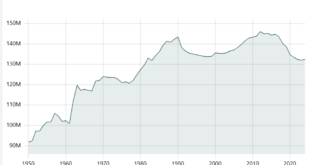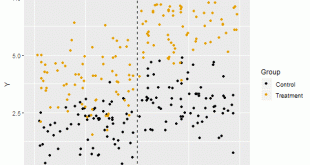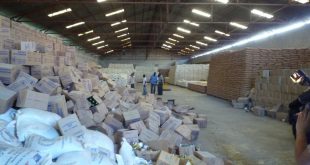Peak Babies was in 2012. At this moment, we´re back to the level of forty years ago (and the most recent data may well be an overestimate). For the first time in centuries, cohorts entering the global labour market will soon be smaller than the cohorts preceding them. Even when there are significant differences in levels between countries, the years around 1970 were a turning point everywhere. In 1965, the relentless movement towards below-replacement human reproduction started....
Read More »IPA’s weekly links
Guest post by Jeff Mosenkis of Innovations for Poverty Action The animation above comes from a cool page of causal inference animations by Nick Huntington-Klein (h/t Alex Tabarrok), which go through, step-by-step with scatterplots, how different methods work. Alex was one of many who offered helpful tips for getting through undergrad econometrics. Call for papers for the Y-Rise conference Dec 15-21 on the science of scaling promising interventions. They have research networks looking at...
Read More »IPA’s weekly links
Guest post by Jeff Mosenkis of Innovations for Poverty Action. The 26 artifacts, which include statutes and thrones looted by French troops during a military raid against the once powerful West African Kingdom of Dahomey in 1892, are among some of the 5,000 artifacts requested from France by Benin. And that’s just Benin, there are an estimated 90,000 looted African artifacts in France. A holy grail in economic development, and really all of business investment, is figuring out which small...
Read More »IPA’s weekly links
Guest post by Jeff Mosenkis of Innovations for Poverty Action. Good links from David McKenzie this week (as always), including this one from CSWEP on mentoring underrepresented minority women in economics.As much as it pains me to link to both David *and* my other Friday links competitor, Tim Ogden of NYU’s faiV, (which focuses on financial inclusion) he’s got a really good piece on CGAP’s blog. It’s ostensibly on what can we expect to learn from financial inclusion research, but really...
Read More »IPA’s weekly links
(From the video at the end of the post)Guest post by Jeff Mosenkis of Innovations for Poverty Action Oxfam releases a report around the same time as Davos every year on who owns what portion of global wealth. Their spin on it is designed to make headlines, but Dylan Matthews explains why it’s really hard to measure.Also in Vox, Stephanie Wykstra provides a nice plain-language summary of what the research says about microloans. A very cool very cross randomized experiment (more than 50...
Read More »IPA’s weekly links
Guest post by Jeff Mosenkis of Innovations for Poverty Action. The effective altruism careers blog 80,000 Hours argues that support roles within an organization, like in operations or assisting, can have big overall impact by multiplying others’ effectiveness. In that vein, IPA’s hiring a global operations director. We’re also hiring what (IMHO) might be one of the most important and complex jobs in the org, Kenya Country Office Director. It involves managing a staff of 500 across several...
Read More »IPA’s weekly links
Guest post by Jeff Mosenkis of Innovations for Poverty Action. In The New Yorker, John Cassidy reviews a new free online open-source economics textbook, The Economy. From an international collaboration of economists, it focuses on newer, post-financial crisis ways of thinking about and teaching economics. Case Western economist Justin Gallagher documents the bizarre fight he went through to get one research group at the University of Texas to turn over the public state data set it was...
Read More »IPA’s weekly links
Guest post by Jeff Mosenkis of Innovations for Poverty Action. In The New Yorker, John Cassidy reviews a new free online open-source economics textbook, The Economy. From an international collaboration of economists, it focuses on newer, post-financial crisis ways of thinking about and teaching economics. Case Western economist Justin Gallagher documents the bizarre fight he went through to get one research group at the University of Texas to turn over the public state data set it...
Read More »IPA’s weekly links
Guest post by Jeff Mosenkis of Innovations for Poverty Action. In The New Yorker, John Cassidy reviews a new free online open-source economics textbook, The Economy. From an international collaboration of economists, it focuses on newer, post-financial crisis ways of thinking about and teaching economics. Case Western economist Justin Gallagher documents the bizarre fight he went through to get one research group at the University of Texas to turn over the public state data set it was...
Read More » Heterodox
Heterodox



